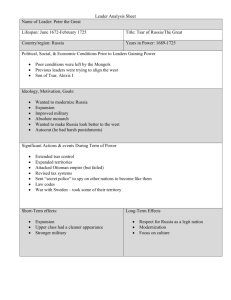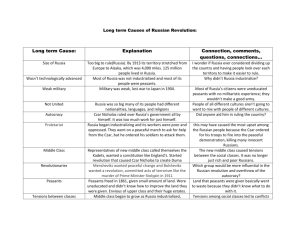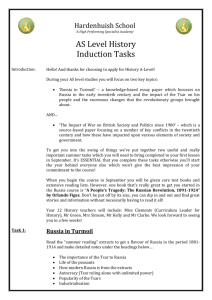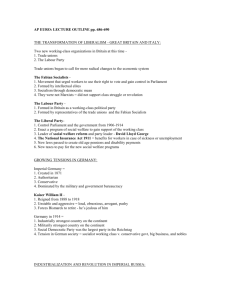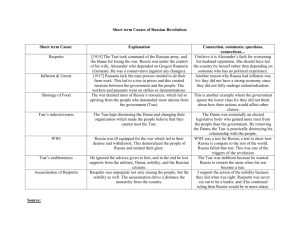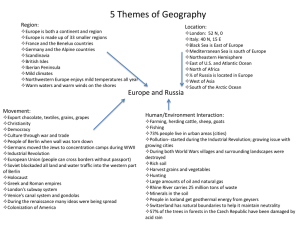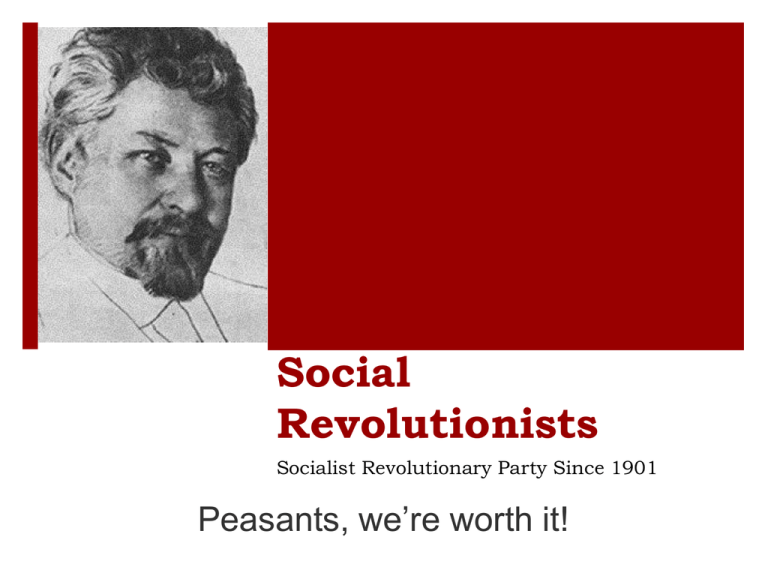
Social
Revolutionists
Socialist Revolutionary Party Since 1901
Peasants, we’re worth it!
Citations
"Russia 1855-1991: From tsars to commissars" by
Peter Oxley,Oxford University Press, 2001
"Communist Russia under Lenin and Stalin" by
Terry Fiehn and Chris Corin, published in London
2002
“The Political Parties in 1905” packet
“Reaction and Revolution: Russia 1894-1924” by
Michael Lynch, published in London 2005
Party Aims
The future of Russia being endangered by the elite’s apathy
and the Tsar’s incompetence in today’s Russia. The
peasants and the working class should rise up against
the oppressors of Russian society, overthrow the Tsar
and create a peaceful society with only one class, the
working class.
The SR party believes in freeing public institutions from the
oppressing upper class and having the public carry out
the functions of these institutions. Likewise private
property will be eliminated entirely.
The future for Russia lies in the hands of those who can
rise up against the exploiters of the working classes and
erase the lines that divide our society into classes.
The SR party
believes in a
peasant led
revolution to
create a
republic of
equal workers.
Party History
The socialist revolutionary (SR) party was
formed in 1901 and it has its roots in the
populist movement (People's Will).
The first congress was held 1906, but the Party
was never well coordinated or centrally
controlled.
It was part of the Duma but it later condemned
it. Alex Kerensky was a part of the Trudoviki
labor group, which represented the peasants in
the Duma. This group's main concern was to
redistribute lands to the peasants.
изменения
Our Internal
Subdivisions
The Social Revolutionary party has internal
subdivision, especially regarding Russia’s participation
in World War One.
Right SR’s are often called “defensists,” because they
believe that Russia should join the war.
On the other hand, Viktor Chernov and his followers
are Left SR’s and are called “internationalists.” They
think that the war will distract the working class from
social rebellion. They are often regarded as
sympathizers with Lenin and the Bolsheviks.
Political Platform
Political Freedoms: Equal and universal
rights for every citizen above 20 years of age
(regardless of national origin, religion and
sex), who will have a variety of freedoms:
meeting, press, speech, strike and unions.
Education: Education will be compulsory
and be provided by the government for all
citizens. All classes will share equal rights in
education – no one class will have more
rights than others.
The Rights of the Workers: The working time will be
reduced, a minimum wage will be settled upon between
administration and lab unions, those below the age of 16 will
be not work and workers need not to work on Sunday as it
will be a rest day.
Nationalities and Minorities: There will no longer be any
difference between ethnic minorities, and there will be no
more forms of violence and exploitation among men.
Regardless of nationality, religion and sex, all men will be
considered as brothers and equality and freedom shall be
introduced.

